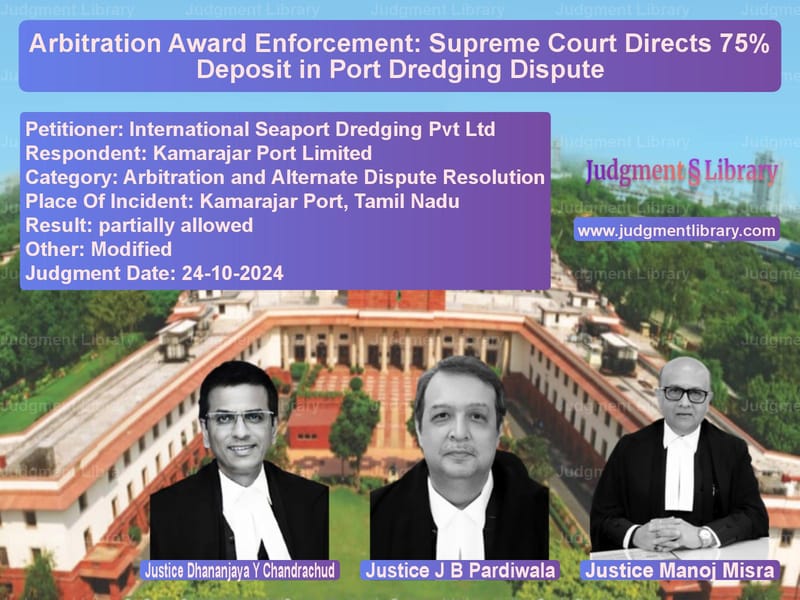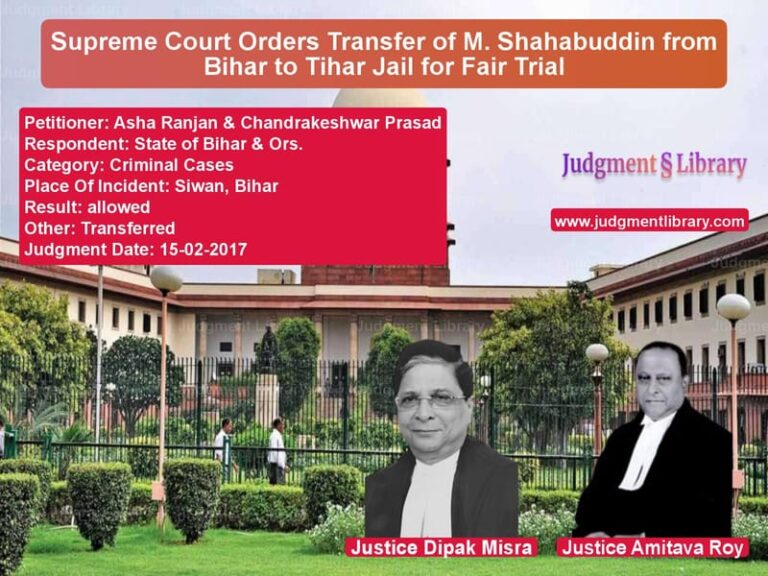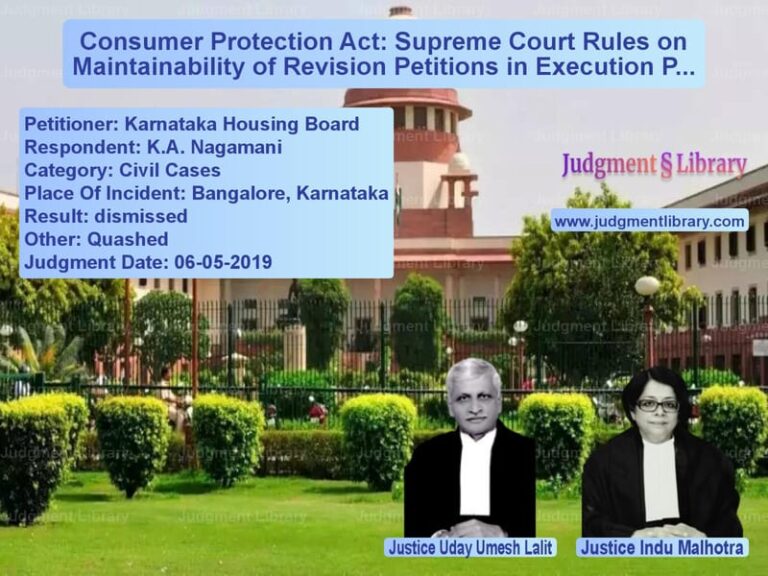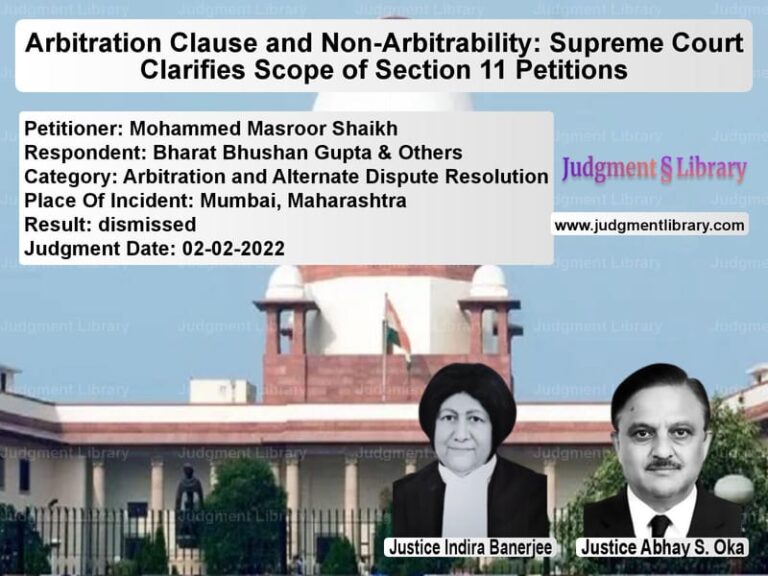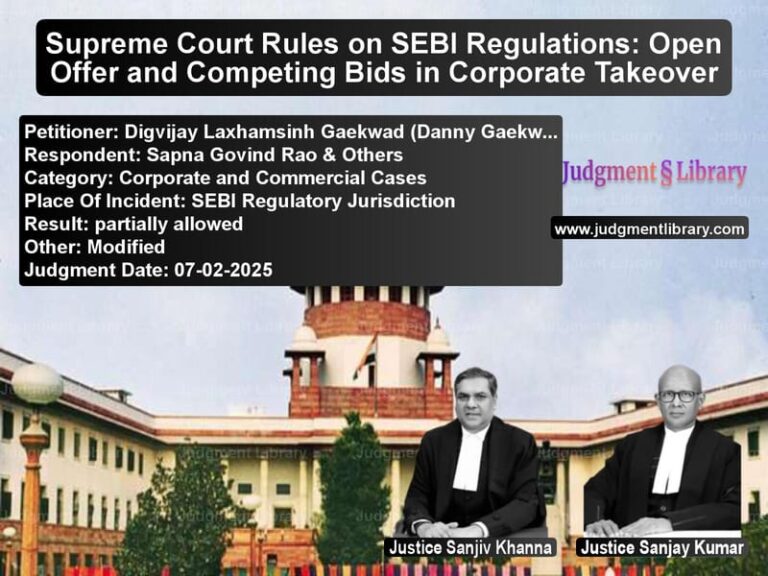Arbitration Award Enforcement: Supreme Court Directs 75% Deposit in Port Dredging Dispute
The case of International Seaport Dredging Pvt Ltd vs. Kamarajar Port Limited is a significant Supreme Court ruling concerning the enforcement of arbitration awards in commercial contracts. The judgment, delivered on October 24, 2024, modifies a Madras High Court order that had stayed the execution of an arbitral award conditional on furnishing a bank guarantee. The Supreme Court ruled that the respondent must deposit 75% of the decretal amount as a condition for staying enforcement.
Background of the Case
The dispute arose from a contract between International Seaport Dredging Pvt Ltd (appellant) and Kamarajar Port Limited (respondent) for Capital Dredging Phase-III at Kamarajar Port. The project, valued at approximately Rs. 274 crores, involved dredging multiple berths, removing boulders and debris, and conducting environmental monitoring.
Read also: https://judgmentlibrary.com/supreme-court-rules-on-arbitration-clause-in-public-premises-dispute/
The arbitral tribunal, in an award dated March 7, 2024, directed the respondent to:
- Pay the appellant Rs. 21,07,66,621 for claims allowed in its favor.
- Pay interest at 9% per annum from November 15, 2017, until the date of the award, increasing to 12% if payment was delayed beyond three months.
- Reimburse Rs. 3,20,86,405 as costs.
Following the award, both parties sought corrections under Section 33 of the Arbitration and Conciliation Act, 1996. The tribunal dismissed the respondent’s request and increased the appellant’s cost recovery by Rs. 12,00,000.
Petitioner’s Arguments
- The appellant contended that the High Court’s order allowing the respondent to furnish only a bank guarantee was unjustified.
- They argued that arbitration awards operate as money decrees and should be enforced similarly under Section 36 of the Arbitration Act.
- The respondent should have been directed to deposit the awarded amount rather than merely providing a bank guarantee.
- The High Court erred in treating the respondent’s status as a statutory entity as a ground for leniency.
Respondents’ Arguments
- The respondent, represented by Kamarajar Port Limited, defended the High Court’s decision.
- They argued that under Order XLI Rule 5 of the CPC, furnishing security is an adequate condition for a stay on execution.
- As a government entity, the respondent maintained that it was financially secure and would comply with any future court orders.
- They contended that previous judicial precedents had upheld the discretion of courts to determine stay conditions.
Supreme Court’s Observations
- The Court reaffirmed that arbitration awards should not be stayed lightly, as it defeats the purpose of an expedited dispute resolution mechanism.
- It cited precedents establishing that government entities should not be given preferential treatment in enforcing arbitral awards.
- The High Court had primarily focused on one claim involving cess refunds while failing to address the other claims amounting to Rs. 18 crores.
- The mere fact that a respondent is a statutory entity does not justify relaxed enforcement conditions.
- The judgment referenced Pam Developments Pvt Ltd vs. State of West Bengal, which clarified that government bodies are not entitled to special treatment in arbitration proceedings.
Supreme Court’s Ruling
- The High Court’s order was modified, requiring the respondent to deposit 75% of the decretal amount, inclusive of interest.
- The respondent must complete the deposit by November 30, 2024.
- The stay on the execution of the arbitral award remains conditional on compliance with this deposit requirement.
- The decision reinforces the obligation of government bodies to honor arbitration awards on par with private entities.
Legal Implications of the Judgment
This ruling has significant consequences for arbitration law and enforcement:
- Strengthening Arbitration Awards: The Court underscored that arbitral awards are equivalent to money decrees and should be enforced accordingly.
- Equal Treatment of Government Entities: Government organizations cannot claim exemptions from standard enforcement procedures.
- Reinforcing Judicial Oversight: The ruling ensures that courts impose meaningful conditions when staying arbitration awards.
- Encouraging Timely Compliance: By mandating partial deposit, the judgment discourages frivolous delays in executing arbitration awards.
Conclusion
The Supreme Court’s decision in this case upholds the integrity of arbitration as a mechanism for commercial dispute resolution. By directing the respondent to deposit 75% of the decretal amount, the judgment ensures that arbitration awards retain their enforceability and discourages unnecessary litigation. This ruling sets a crucial precedent for the enforcement of arbitral awards in India.
Petitioner Name: International Seaport Dredging Pvt Ltd.Respondent Name: Kamarajar Port Limited.Judgment By: Justice Dhananjaya Y Chandrachud, Justice J B Pardiwala, Justice Manoj Misra.Place Of Incident: Kamarajar Port, Tamil Nadu.Judgment Date: 24-10-2024.
Don’t miss out on the full details! Download the complete judgment in PDF format below and gain valuable insights instantly!
Download Judgment: international-seapor-vs-kamarajar-port-limit-supreme-court-of-india-judgment-dated-24-10-2024.pdf
Directly Download Judgment: Directly download this Judgment
See all petitions in Arbitration Awards
See all petitions in Dispute Resolution Mechanisms
See all petitions in Commercial Arbitration
See all petitions in Enforcement of Awards
See all petitions in Judgment by Dhananjaya Y Chandrachud
See all petitions in Judgment by J.B. Pardiwala
See all petitions in Judgment by Manoj Misra
See all petitions in partially allowed
See all petitions in Modified
See all petitions in supreme court of India judgments October 2024
See all petitions in 2024 judgments
See all posts in Arbitration and Alternate Dispute Resolution Category
See all allowed petitions in Arbitration and Alternate Dispute Resolution Category
See all Dismissed petitions in Arbitration and Alternate Dispute Resolution Category
See all partially allowed petitions in Arbitration and Alternate Dispute Resolution Category

